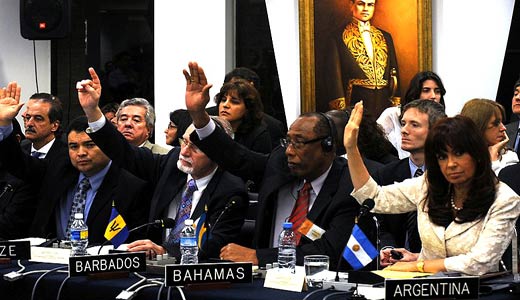
In another fit of the kind of lunacy that is turning the Republican majority in the House of Representatives into a source of universal wonder and fear, the House Committee on Foreign Relations voted 22 to 20, in a party-line vote, on Wednesday to cancel the payment of this year’s $48.5 million dues to the year-old Organization of American States.
The attack on the OAS was instigated by Republican members of Congress, led by Congresswoman Ileana Ros-Lehtinen (R-Florida), the current Chair of the House Foreign Affairs Committee. Florida Republican representative David Rivera even characterized the OAS as an “enemy” of the United States. The GOP politicians portrayed the OAS as an organization controlled by left-wing states such as Cuba and Venezuela. They also denounced the OAS for opposing the June 2009 military coup d’état against leftist President Manuel Zelaya of Honduras.
A number of right-wing ‘heroes’ on Capitol Hill, including Ms. Ros-Lehtinen, were heavily involved in organizing support in the United States for the coup government led by businessman Roberto Micheletti, and have strong ties to ultra-rightist and anti-democratic circles in a number of Latin American countries, including people involved in various coup plots.
So what is the real situation?
The Organization of American States was founded in 1948 at the instigation of the United States, with the openly stated goal of stopping the “spread of communism” in Latin America. It started with a bang: Just as then U.S. Secretary of State George Marshall was in Bogota, Colombia, for the founding session, the assassination of a populist candidate for Colombia’s presidency, Jorge Eliecer Gaitan, set off a wild riot (the famous “Bogotazo”) and initiating decades of violence in Colombia’s countryside and cities, a situation that still goes on today.
In its 63 years of existence, the OAS has, for the most part, turned a blind eye to brutal abuses of power and violations of human and democratic rights all over the hemisphere. However, it has been consistent, until very recently, in one thing: The exclusion of Cuba (in 2009, over strenuous U.S. objections, the OAS retired its general objection to Cuban membership; however, a formula has not yet been found to integrate Cuba into the organization).
For the most part, the OAS has been seen by the Cubans and left-leaning Latin Americans as simply an instrument of imperialism; of guaranteeing U.S. domination of the politics of the western hemisphere.
However, in recent years, the coming to power of left and left-center governments in many countries of the region has meant that the United States has not been getting its way every time. For example, the OAS had voted to cut economic support for Honduras after the 2009 coup, but the U.S. State Department did not entirely go along with this, and furthermore started a separate process, outside of the structure of the OAS, to “mediate” the Honduras dispute, using then Costa Rican President Oscar Arias as a go-between. This was seen by many in Latin America as a mechanism for taking pressure off the Honduran coup government.
For this reason and others, 32 Latin American and Caribbean countries have been getting together in recent years to start a new organization whose purpose is to fend off U.S. efforts to control the region. The organization, the Community of Latin American and Caribbean States (CELAC) explicitly excludes the United States and Canada from membership, based on bad memories of the OAS.
This is co-chaired by left-wing President Hugo Chavez of Venezuela and conservative President Sebastian PiÒera of Chile. Besides left and left-center governments such as those of Argentina, Bolivia, Brazil, Cuba, Uruguay and Venezuela, right-wing governments such as those of Presidents Felipe Calderon of Mexico, Piñera of Chile, Santos of Colombia and others are participating.
The initiation of CELAC was announced on February 23, 2010. On July 5 of this year, CELAC was supposed to be officially launched in a meeting and ceremony in Caracas, Venezuela. However, the illness of President Chavez led to a suspension of the event, as he has gone to Cuba for follow up treatment for cancer. A new date for the event is being decided. (Vice President Elias Jaua will stand in for Chavez while he is away).
Democrats in Congress reacted angrily to the GOP maneuver to defund the OAS as a new form of isolation. They pointed to the help the OAS provided for this year’s cycle of elections in Haiti.
However, many feel that even that is a dubious boon; the elections excluded, on technicalities, the presidential candidacy of anybody from Haiti’s most popular party, ex President Jean-Bertrand Aristide’s Fanmi Lavalas, and the OAS meddling brought about the choice of the most right-wing candidate in the Haitian election, namely Micky Martelly, who has links to the old Duvalier dictatorship.
The GOP measure also cuts off much aid to Pakistan.
Photo: The people attending the 2009 Extraordinary Assembly of the Organization of American States vote to suspend Honduras. Via Wikipedia.

MOST POPULAR TODAY


Zionist organizations leading campaign to stop ceasefire resolutions in D.C. area

Communist Karol Cariola elected president of Chile’s legislature

Afghanistan’s socialist years: The promising future killed off by U.S. imperialism

High Court essentially bans demonstrations, freedom of assembly in Deep South






Comments